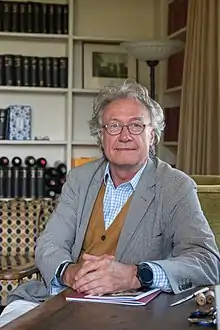David Paterson (physiologist)
David James Paterson Hon FRSNZ[1] is a New Zealand-born British physiologist and academic. He is a Fellow of Merton College, Oxford and Professor of Cardiovascular Physiology at the University of Oxford. He is also the Head of the Department of Physiology, Anatomy and Genetics at Oxford, and President of The Physiological Society.[2] Paterson is best known for his work in cardiac neurobiology, linking the nervous system to heart rhythm, which was featured in the 2012 BBC Four documentary Heart v Mind: What Makes Us Human?, and associated interviews on RNZ National Science programme Heart v Mind.[3] In 2018 he co-authored with Neil Herring the text book Levick's Introduction to Cardiovascular Physiology, 6th edition.[4]
David J. Paterson | |
|---|---|
 | |
| Born | 21 April 1959 |
| Awards | Rolleston Memorial Prize (1989) GL Brown Prize Lecture (2000) Carl Ludwig Distinguished Lecturer (2018) |
| Academic background | |
| Alma mater | University of Otago University of Western Australia University of Oxford |
| Academic work | |
| Sub-discipline | Cardiac Neurobiology |
Early life and education
Paterson was born in Timaru, New Zealand on 21 April 1959. He attended Otago Boys' High School and the University of Otago before training as a secondary teacher. He was awarded a Master of Science degree in 1985 from the University of Western Australia, and won a Hackett scholarship to New College, Oxford and completed a DPhil thesis, in 1989, on the control of breathing and chemoreception from the University Laboratory of Physiology. In 2005, he was awarded a Doctor of Science degree from the University of Western Australia.
Career
Paterson was elected to a Junior Research Fellowship at Christ Church, Oxford from 1988 to 1991. He switched fields when appointed to a British Heart Foundation Lectureship in 1991 in cardiovascular physiology at Oxford. In 1994, he was made a University Lecturer in association with a Tutorial Fellowship at Merton College, Oxford, and then, in 1998, a Reader in Physiology and in 2002, Professor of Cardiovascular Physiology. In 2016, Paterson was appointed Head of the Department of Physiology, Anatomy and Genetics at Oxford, and in 2018 was made President-elect of The Physiological Society to serve as President in 2020–22.[2] Paterson was the Editor-in-Chief of Experimental Physiology from 2006 to 2011 and of The Journal of Physiology from 2011 to 2016.[5]
Research
Paterson is best known for his studies on potassium,[6] chemoreception[7] and respiratory control, and more recently for his discovery linking peptides and the gaseous messenger nitric oxide to cyclic nucleotide coupled cardiac autonomic neurotransmission. His work has contributed to the understanding of how the nervous system modulates cardiac excitability in health and disease.[8]
References
- "David Paterson, Hon Fellow, FRSNZ".
- "David Paterson, President".
- "Paterson, renowned neurobiologist, comes to Iowa".
- "Levick's Introduction to Cardiovascular Physiology".
- Paterson, David J. (2016). "Passing the baton". The Journal of Physiology. 594 (6): 1503–1505. doi:10.1113/JP272111. PMC 4799984. PMID 26995257.
- Paterson, David J.; Robbins, Peter A.; Nye, Piers C. G. (1992). "Introduction: Role of Potassium in Exercise Hyperpnoea". Control of Breathing and Its Modeling Perspective. pp. 409–416. doi:10.1007/978-1-4757-9847-0_72. ISBN 978-1-4757-9849-4.
- Paterson, David J. (2005). "Targeting Arterial Chemoreceptor Over-Activity in Heart Failure With a Gas". Circulation Research. 97 (3): 201–203. doi:10.1161/01.res.0000177931.10616.cb. PMID 16081873.
- Li, D.; Paterson, D. J. (2016). "Cyclic nucleotide regulation of cardiac sympatho‐vagal responsiveness". The Journal of Physiology. 594 (14): 3993–4008. doi:10.1113/JP271827. PMC 4945711. PMID 26915722.